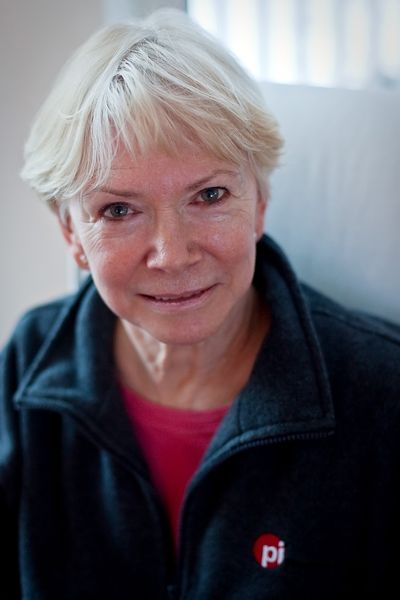Daughter sure her father’s finally at peace
Remains brought to CdA after 50-plus years in Panama

Fifty years of not knowing took its toll on Kay Cummins.
Years measured in unanswered letters for information. Years clinging to faint memories of a smiling, taciturn man. Years wondering why her mother never revealed the truth.
But last spring in a well-manicured cemetery just outside Panama City, she finally found her father.
“It was just overwhelming. The search was over, you know?” said Cummins, 66, who lives in Hayden and Sacramento, Calif. “Not to know where he was. … It’s a hole in your life that you can’t fill with anything else.”
It took 50-plus years after her father’s death to track down his final resting place, a family mystery since his fatal heart attack in 1956 while working at a U.S. naval base in the Panama Canal Zone.
“Our mother knew initially (where he was buried), but she wouldn’t tell us,” Cummins said of how she and her sister nagged for answers. “As she got older we’d ask her, and she said she didn’t know, she just didn’t know. I think it was guilt that she didn’t do what he would’ve wanted her to do.”
Cummins could never let go of the certainty that her father, Cloys Herbert Harkleroad, should be buried in Coeur d’Alene, where he had found success and built his family.
“This was a place that he loved,” she said.
The Arkansas-born man had moved to North Idaho in 1926 to find whatever work he could, first as a miner and then an employee of the U.S. Forest Service.
He became a fixture on Sherman Avenue from 1941 to 1949 with his shop, Bill’s Electric, named after the moniker that folks found easier on the tongue than his birth name.
That experience landed him the big opportunity in 1953, Cummins said, when he hooked a job operating the electrical system at Rodman Naval Station in Panama.
“He was a very good electrician. He was good at what he did,” she remembered.
The whole family moved with him to Central America, Cummins said, where life was blissful for 3 1/2 years among lush forests and glittering blue ocean.
“It was an adventure,” she said. “We swam every day in the base pool. We had a cafeteria, and there was a new movie every night they showed for the military. We did all those things that one does in a community.”
Every Sunday belonged to Cummins and her father.
“We’d go out and go for long drives,” she said. “Sundays were his day.”
All that ended when she was 13.
No one saw heart failure coming for the 50-year-old family man.
“It was a huge loss to all of us,” Cummins said. “He was everything to me.”
Cummins’ mother, suddenly single and without a job, made split-second decisions to cremate her husband and bury him in Panama, which the family knew he hadn’t wanted.
“You have to understand, my mother was a woman who had never worked in her life, and now she had a child to support and she didn’t know what to do,” Cummins said, adding that her older sister had already left home. “She was in a chaotic situation. We were far away from friends and family, and communications weren’t what they are now.”
They never visited Harkleroad’s grave before they moved to Long Beach, Calif., Cummins said.
That has haunted her.
“We had all left him behind,” she said. “I just needed to know where he was, that he was in a good place.”
Knowing her father had died at Gorgas Hospital in Ancon, Panama, Cummins sent letters to the facility in the ’70s and ’80s. She never got a response.
She admits she gave up, thinking the worst.
“Especially after we gave up the canal, I thought that he was lost,” she said of the U.S. decision to transfer canal ownership to Panama in the late ’70s. “My letters didn’t get me anywhere. I couldn’t locate him on the Internet. I wasn’t sure there was anything that I could do.”
Not until last year.
Cummins, marketing manager of the Aerospace Museum of California, recognized an opportunity last year when a military chief called her about renting space in the facility.
“It’s a standard story that chiefs run the military. They know everything,” she said. “If you want information, you go to a chief.”
She asked if he would know anything about a man buried overseas. Within 24 hours, she received the name of the cemetery where her father was buried: The Corozal American Cemetery and Memorial.
“I called my sister. We arranged for a trip to Panama,” she said, adding that her sister, Esther Lee Norvell, lives in Nantucket, Mass. “We located the cemetery and it was actually quite beautiful. Very well cared for.”
But it wasn’t home.
She wrote to the American Battle Monuments Commission in Arlington, Va., which manages American cemeteries on foreign soil. She received a letter late this year granting permission to disinter her father’s remains and return them to the U.S.
At the bottom of the letter, a commissioner had scrawled two words: “God speed.”
Harkleroad’s urn was delivered in December to Forest Cemetery in Coeur d’Alene, where he was to be laid to rest on Thursday.
Cummins and her sister planned to be there, Cummins said. They will gather the rest of the family for a formal service later this year.
“We want to welcome him home properly,” she said.
Now he will be among family, she added, explaining that his first wife who died during childbirth is also buried in Forest Cemetery.
“This is just perfect,” she said. “I really think he probably felt lost all those years. Now that he’s back, I’m totally convinced that this is where he would want to be.”